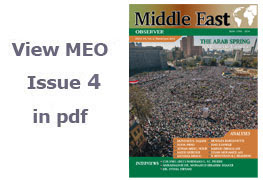By Antonia Dimou
The wave of pro-democracy protests that swept across the Arab world has stricken like an earthquake that is changing the ground underneath. The protests have been dubbed the “Arab Spring” and it looks as if this will be succeeded by a long, hot summer of hope. It is a spring that supported the notion that Arab people crave freedom, democracy, justice, economic reforms and the right to demand accountability from their governments.
The successfuluprisings in Tunisia and Egypt that ended in the removal of longtime regimes have inspired the youth of the region to seize the opportunity of taking the future into their own hands. Historically speaking, what has happened is without precedent in the Arab world. For the first time, Arab countries illustrated the potential of spontaneous democracy, or more accurately, democratisation from within.
A cloud however that may shadow the Arab spring and render yet more difficult the blossoming of democracy is that forces opposed to democratic transition remain somehow powerful. In any case, political clocks cannot be turned back. Too much political mobilisation has occurred for the status quo ante to come to the fore. The current special issue of the Middle East Observer deals with the revolutionary wave of protests, which set off a chain reaction that has blown up the entire region and engulfed most of the states of North Africa and the Middle East, with spreading effects into countries like Libya and Syria.
Writing from the region as the Arab spring sparked, flared and spread, our contributors make no pretence about providing answers to the complex countryby-country issues addressed, and articulate their views with sincerity and clarity, and thus increase our understanding of the complex issues and the challenge of underpinning the changes the Arab people are fighting for, including the promotion of modern political demands beyond the client-list negotiations of the old power-networks.
Undoubtedly, the regional wave of prodemocracy protests offer a historic opportunity to observe the birth of the new from the old, and provide a momentum of transformation where the idea of democracy advances as the best solution for politically and peacefully handling multiple and different country-by-country interests and structures.
The road to democracy has always been rocky if we look at a century of upheavals in Europe, and is a work in progress that cannot be constrained by any timeframe. Definitely, the road to democracy may be winding and is like a river taking many curves, but eventually, the river will reach the ocean.
*Antonia Dimou is Head of the Middle East and Persian Gulf Unit at the Institute for Security and Defense Analyses based in Athens, Greece and an associate at the Centre for Strategic Studies, University of Jordan, Amman Jordan.


No comments:
Post a Comment